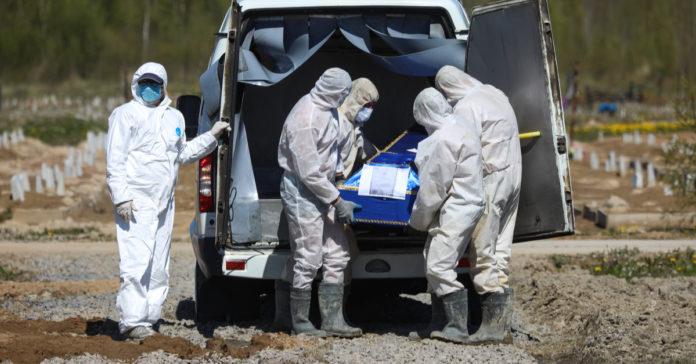A new survey has revealed the devastating impact of the COVID-19 pandemic on the lives of British Muslims, as well as a silver lining which the wider population has not experienced.
The report, A Year of Lockdown: The Impact on Muslims by the Muslim Census organisation, found that British Muslims have been disproportionately affected in every conceivable way compared to the wider population.
But it also found that the pandemic has given Muslims the opportunity to connect with their faith in a more profound way.
The major findings of the report include that:
- Muslims have tested positive for COVID-19 at a rate 3.5 times higher than the national average.
- Seven out of 10 young Muslims said that the pandemic has negatively impacted their mental health.
- Muslims lost their jobs at a rate six times greater than the rest of the UK.
Muslim Census surveyed 1,000 Muslims aged 18+ living in the UK to understand their experiences and the impact that the pandemic has had on their lives in terms of employment, poverty, healthcare and family relationships.
Overall, 23% of Muslims said that they have tested positive for COVID-19 during the pandemic. Muslims within the 45+ age group showed the highest rate of positive COVID-19 tests at 27%, whilst the Bangladeshi ethnic group showed the highest rate of infection of any ethnic group at 27%.
22% of Muslims employed within the education sector reported to have tested positive for COVID-19. This increased to 23% for Muslims employed within the healthcare sector and 28% for those employed within the hospitality and retail sectors.
Subscribe to our newsletter and stay updated on the latest news and updates from around the Muslim world!
Geographical distribution and socio-economic deprivation was also a contributing factor to high COVID-19 rates with an overwhelming majority of the Muslim population residing in urban areas where rates are higher.
The prevalence of intergenerational households within the Muslim population was also a contributing factor. The percentage of Muslims within one or two generation households reporting to have tested positive for COVID-19 was 22%, although this increased substantially to 30% in households with three or more generations.
Muslims have also seen worse labour market outcomes as a result of COVID-19 compared to the rest of the population – 15% have lost their job (or a previously agreed job) since March 2020, while employment for the wider population has fallen just 2.5%.
22% of Muslims have been furloughed – a similar rate to the national average at its peak in May – although this varies significantly between different ethnic groups. The highest furlough rate was within the Bangladeshis ethnic group at 40% – almost double the national rate.
And 17% of Muslims said their household income had fallen below £1,000 per month during the pandemic – meaning 17% have fallen into poverty, as defined by the Joseph Rowntree Foundation, as a result of the COVID-19 crisis.
Mental health
The survey also asked “How has COVID-19 impacted your mental health?” with more than half (58%) of the 1,000 respondents reporting a negative impact.
70% of responses belonging to the 18–24 year old age group reported that the pandemic had negatively affected their mental health. And of those that said that the COVID-19 pandemic had negatively affected their mental health, 57% were women.
Of the 1,000 responses, 59% of Muslims said that they felt lonely “Always” or “Sometimes” during the pandemic.
38% of participants recorded that they have lost a loved one with Bangladeshi and Indian respondents reporting the highest at 43%. Of those responses, 73% reported that their grieving experience was “very difficult” and “numbing”. Many felt that they could not grieve properly without the support of friends and family which has been limited due to social distancing restrictions.
“I lost my dad way too early… My dad was only 59 and like many other BAME individuals was taken too early. I’m doing things I never thought I’d had to do so early in my life. Allah knows best,” one respondent said.

“It doesn’t feel real, because we haven’t been able to grieve with relatives, attend the funeral or visit the house of the deceased to pay our respects,” another said.
On the other hand, Muslims generally encountered an increased closeness to their faith throughout the pandemic and the successive regional and national lockdowns, with 61% of those surveyed saying so.
Respondents overwhelmingly highlighted increased free time to worship, reflect and learn as being the major reasons for them becoming closer to their faith. This is set against a backdrop of only 5% of UK respondents reporting a strengthening in their faith.
Working from home or being furloughed meant respondents were able to perform their daily prayers on time, as well as allowing them to perform additional prayers. Many respondents highlighted how they usually struggle to pray on time at work, but as a result of the lockdowns this hasn’t been an issue.
Increased free time allowed for not only more worship but also more contemplation, reflection and self-development in various areas, including faith. Some highlighted how they were able to use this time to undertake extra lessons and courses, and with the online nature of learning, many were able to take classes they previously wouldn’t have been able to.
Being at home and hence having greater contact with family more was a reason some gave for their increased closeness with their faith. We also found that 66% of Muslims saw an improvement in their relationships with their families, whereas only 12% of respondents reported an improvement in their family relations in a YouGov survey in 2020.
Some respondents also spoke of the advent of a global pandemic, and even catching COVID, as being a sobering and life-changing experience, encouraging them to take up extra worship and other faith-related activities.


















